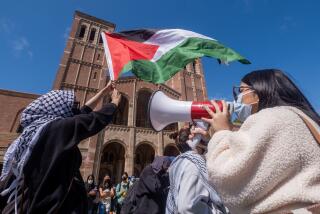Peres Courts Youth Vote, a Key to Israeli Election
- Share via
KFAR SAVA, Israel — In an auditorium full of high school students, 11th-grader Edna Yaari stepped nervously to the microphone to ask Prime Minister Shimon Peres to spell out his vision of the future for her generation.
Peres, just back from Washington and hitting the campaign trail for the first time since Israel’s military offensive in Lebanon, laid out his vision of negotiating peace with Syria and a final agreement with the Palestinians.
“The Jewish people have always had more intelligence than geography. In the last four years, we may have lost territory, but we have won opportunities,” Peres told the audience. “The job of my generation is to make the tough and unpleasant decisions so that yours may enter the next century without obstacles, problems or a weight on your back.”
The 18-year-olds listening to Peres, however, seemed to feel that they are the ones facing a tough choice. They are among the more than 300,000 Israeli youths who are eligible to vote for the first time this year in what is also the country’s first direct election for prime minister.
These young voters represent about 10% of the electorate and could cast deciding ballots in a neck-and-neck race that shows Peres just 5 percentage points ahead of the opposition Likud Party candidate, Benjamin Netanyahu.
“We are the new voices, the new votes,” said Sigal Klein, a young woman in braces who seemed to feel the weight of her responsibility. The tight race, she added, “makes the decision a little more difficult. For me, the main consideration is security.”
Security--peace with security--is virtually the only issue for most Israelis as the campaign enters its final weeks. Israel’s economic policy and social concerns are overshadowed by the question of which candidate, Peres or Netanyahu, can be trusted to negotiate a secure peace with Arab neighbors.
On his campaign swing through Kfar Sava, Peres toured the “confrontation line” that separates the Israeli town from Palestinian-ruled Kalqilya in the West Bank, and spoke with local dignitaries and new immigrants. But the jet-lagged prime minister clearly saved his energy and enthusiasm for the students.
After the assassination of Prime Minister Yitzhak Rabin by a right-wing Jewish law student in November, Peres’ Labor Party saw a tremendous upsurge in support and new registrations. A considerable part of that came from young mourners horrified by the murder of a man they saw as a pragmatic soldier-turned-peacemaker trying to secure a “normal” life for them.
Most of that new support, however, has been eroded by the wave of suicide bombings that members of the extremist Islamic group Hamas unleashed on Israel on Feb. 25, killing more than 60 people. Now the youth vote is as divided as that of the public at large, pollsters say.
Labor supporters clearly hope to revive that support with a rally in Tel Aviv on Saturday marking six months since the murder of Rabin. Organizers of the “Peace Generation” rally deny that it is a campaign event favoring Peres, but they will play Rabin’s last speech and his widow, Leah, will speak. The rally will be held in the plaza where Rabin was murdered.
Not to be outdone, Likud also is working high school and college campuses, and bus stops on routes where young soldiers in obligatory military service travel to and from their bases on weekends. “We hand out information and cold drinks,” said a Likud campaign spokesman.
Likud slogans say that peace with Peres is no peace. “The whole country is in fear,” says their latest ad. “The next attack can come at any second.”
Labor’s answer: “A strong country makes peace.”
Outside Sapir Auditorium, where Peres took questions from students, scores of youths from the competing camps engaged in verbal battle. Although Peres is 72 and Netanyahu 47, age appeared not to be an issue.
“I support Bibi,” 18-year-old Kobi Menachem said, referring to Netanyahu by his nickname. “I don’t believe Peres. He said we have peace, and people are still dying on the buses.”
Shahar Roth, who will turn 18 in time to vote May 29, said he used to agree with the Israeli right wing but does not anymore.
“I used to think we have to keep all of the land for ourselves and not compromise,” Roth said. “Now I think Peres’ way is the right way.”
More to Read
Sign up for Essential California
The most important California stories and recommendations in your inbox every morning.
You may occasionally receive promotional content from the Los Angeles Times.










